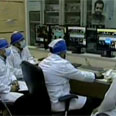
Iranian nuclear reactor
Miss on the way to a bomb
Op-ed: Netanyahu must find new ways to curb Iran's nuclear ambitions; threats aren't enough
The issue of a military strike in Iran is no longer on the table. Reality determined this. The State of Israel had countless opportunities to attack the nuclear installations, but it chose to postpone the decision. The options decreased as time passed. The point of no return was crossed each year, and Iran continues its race toward a nuclear bomb.
A military attack is based on three elements: Operational capability, international support and political decision-making. The first element still exists, although the indecisiveness did exact a certain price. The time that has passed decreased the efficiency of the military strike and increased the risks involved. On the other hand, Israel is still in the game. The means for an effective strike exist. We can still damage the nuclear project.
With regards to the second element – international support – Israel finds itself in a problematic position. The recent elections in Iran dealt a devastating blow to the effort to create broad international agreement. As president, Ahmadinejad was an asset to Israel's public diplomacy. Whenever he opened his mouth he shot himself in the foot. The combination of nuclear weapons, Holocaust denial and calls to annihilate Israel made it rather easy for Israel to promote its position.
The world was opposed to an Israeli military operation, but only because it feared the results of the escalation: Local interests that mixed gas prices with the negative influences of the Muslim world. During his first term, President Obama searched for every possible way to avoid a confrontation, but he failed. Ahmadinejad's conduct was illogical. His statements damaged Iran's ability to pursue its nuclear program under the radar. The diplomatic disputes he created brought the West closer to Israel and distanced him from the East.
Despite Washington's statements, the recent elections in Iran gave the West a comfortable ladder with which it can climb down from the tree. President-Elect Rohani's moderate statements are like music to the ears of those who object to a strike on Iran. Wishes overcome doubts and facts. Iran can buy valuable time under the cover of moderateness. Israel, for its part, will lose its legitimacy to act.
And if all this was not enough, the third element – the political decision – has become more complicated. For four years Netanyahu headed a government that would have made it easy to reach a decision to attack. Then-Defense Minister Ehud Barak supported a strike, as did other ministers. Netanyahu dealt with critics from within the security establishment and with outside criticism. He was close, but then he stopped. Now he is alone. The current government is comprised of new ministers with a lot of political power and of decision-makers who will have a hard time withstanding public pressure. The price of the mistake of a military operation has increased. What was is not what will be. New politicians don't necessarily like new risks.
Netanyahu is left with the results of his previous term – for good and bad. To the PM's credit, the international pressure he created led to a global awakening. Harsh sanctions were imposed on Iran largely due to Netanyahu's threats. The West was afraid of Israel's intention to attack more than it feared Iran's intention to produce nuclear weapons. The problem is that deterrence relies on action and past experience.
Israel has an interest in bringing Iran back to the international discourse in order to make it clear that everything is on the table. In the past Netanyahu accomplished this with words, and for a long period of time it was enough. Now he'll have to find new ways. There's not enough room on the table. There are too many statements on it.










